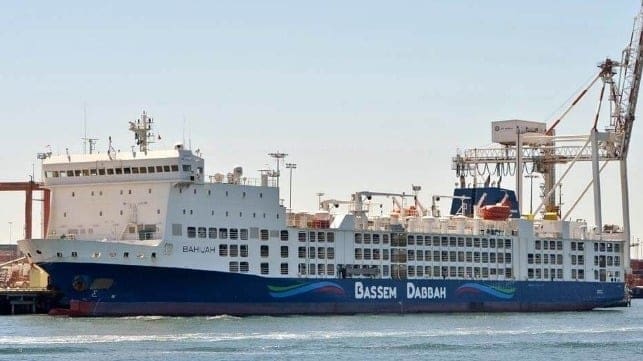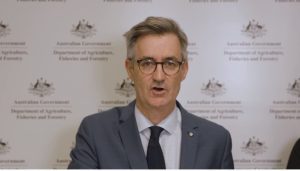
The MV Bahijah in Fremantle in 2018 (Bahnfrend – CC BY-SA 4.0 DEED)
AN Israel exporter denied approval for a sheep and cattle shipment to depart Western Australia wants to persist with re-export plans, a WA farmer leader has claimed.
The Federal Government’s live export regulator last night denied Israeli exporter Bassem Dabbah approval to re-export about 14,000 sheep and 1200 cattle aboard the MV Bahijah, two weeks after ordering the vessel back to Fremantle due to tensions in the Red Sea.
Department of Agriculture Fisheries and Forestry secretary Adam Fennessy said the application submitted on 26 January for the re-export of livestock on board the MV Bahijah to Israel via the Cape of Good Hope has not been approved by his department.

DAFF secretary Adam Fennessy.
Mr Fennessy said the departmental regulator was unable to be satisfied, in accordance with subsection 8-6(3) of the Export Control (Animals) Rules 2021 (Rules), that:
the requirements of the Export Control Act 2020 (Act) in relation to the export of livestock have been complied with, or will be complied with before the livestock are imported into the importing country, and
the importing country requirements relating to the livestock have been met, or will be met before the livestock are imported into the importing country, and
the arrangements for the transport of the livestock to their final overseas destination are appropriate to ensure their health and welfare.
The re-export application was complicated by legal action by Israeli animal protection groups aimed at preventing the livestock’s importation.
Re-export plan remains

WAFarmers Livestock Council president Geoff Pearson.
WA Farmers Livestock Council president Geoff Pearson confirmed that the plan was still to prepare the sheep and cattle for re-export to Israel after resting on shore for at least 5-10 days.
Mr Pearson expressed some relief that the department had made a decision on the MV Bahijah shipment and “we know where we are heading now.”
“But the delay in the department coming back has been frustrating – 19 days or something now – and hopefully we can offload the livestock and start preparing them for their re-export.”
Mr Pearson said the feeder cattle in the shipment were not “up to spec” for processing and would need to go into a feeding program and the intention is to re-export them.
“The lambs could be processed, but the issue would be getting (abattoir) space.”
Mr Pearson said there is no feedlot space available to unload the MV Bahijah, because there were two other ships waiting to load about 40-50,000 sheep for shipment to the Persian Gulf.
ALEC condemns politicisation of export shipment
Australian Livestock Exporters Council chief executive officer Mark Harvey-Sutton said DAFF had exercised its responsibility to make the decision on the MV Bahijah shipment.
However, he said ALEC continued to be genuinely disappointed that activist groups, in particular the RSPCA, and some politicians, spread misinformation and untruths about conditions on board the vessel.
“In many instances it was deliberately misleading, and we would expect much better from groups such as the RSPCA and our elected parliamentarians.”
Mr Harvey-Sutton said ALEC also condemned the politicisation of this issue, “given that this vessel was unable to exercise freedom of navigation as a result of terrorism from Houthi Rebel forces.”
“Freedom of navigation is a right that the Australian Government supports and one which should extend to all ships carrying Australian exports.”
However, Mr Harvey-Sutton said he did not believe DAFF had denied the MV Bahijah its ‘right of navigation’ by ordering its return to Australia on 20 January.
“The department was face with many options and they have exercised the powers that they have responsibility for.
“The department as regulator of the industry has many powers that it is charged with, principally to ensure animal welfare, and they have powers under legislation to issue a direction to a vessel if they that to be in the best interests of animal welfare,” he said.
“Ultimately, the vessel must comply and I note that they did so on this occasion.”
Mr Harvey-Sutton said any moves to use this issue to attempt to further the government’s proposed ban on live sheep exports would be “cheap, callous, and cynical, particularly given the acute focus on food security by our trading partners currently given ongoing conflict in the Middle East region.”
Mr Harvey- Sutton said on 16 January, the shipping company made the decision to re-route the MV Bahijah to South Africa, due to security concerns, given the danger posed by Houthi rebels in the Red Sea to an Israeli shipment.
“While en route to South Africa the exporter considered their options before being directed by DAFF to return to Australia on 20 January.
“Since then, ALEC has been imploring DAFF to be decisive and give clarity on what the next steps are for the consignment,” he said.
He said ALEC has not pursued a particular outcome during the DAFF approval process and the trade’s task is now to work as an industry to work through next steps with animal welfare being its highest priority, noting that the animals continue to be in good condition.
“This issue, which involved exceptional circumstances, demonstrates that we have the necessary processes in place to deal with scenarios like this.”
Mr Pearson said it is possible that the department had cut across the vessel’s ‘freedom of navigation’ by demanding its return to Australia without working out an alternative for the shipment before it arrived back in Australian waters.
“We had an opportunity to continue the export journey or return, but that decision wasn’t made until some time later, so the situation could have been different.”
RSPCA “extremely alarmed” at any plans to re-export
RSPCA Australia chief scientist Dr Suzanne Fowler said the organisation ispleased and relieved that DAFF has seen fit to deny “the ill-conceived application” to re-export the thousands of sheep and cattle the MV Bahijah.
“This desperate plan would have subjected the animals to a gruelling and extended journey of more than 65 days – that is, 33-plus more days on top of the 32 they’ve already been confined to the vessel.
“This would have made it one of the longest live export journeys in living memory,” she said.
“The journey via the Cape of Good Hope, as requested in the now-denied application, would have been fraught with all the usual stressors of a live export journey, with the added fatigue the animals have already experienced after 32 days at sea, and the treacherous conditions often experienced by vessels navigating that route.
“Protecting these animals from the consequences of further export was the right thing to do.”
Dr Fowler said the only right decision now is to have the animals humanely processed in Australia.
“We would be extremely alarmed if there was any proposal to re-export them at a future time.
“They’ve suffered enough,” she said.
Dr Fowler urged the exporter, Bassem Dabbah, to avoid further unnecessary delay, and safely offload the animals as soon as possible and make immediate arrangements with local stakeholders and the department.
“We need to remember that these animals are not yet safe from danger; they are stressed, fatigued and continue to be at risk of illness, disease and death.
“As a result of the delays so far, further fatalities are almost inevitable. We expect that any handling will be done in a low stress manner and with the welfare of the animals as a priority,” she said.
“Once again, this situation highlights that it is impossible to regulate this inherently risky industry.
“Live animal export cannot be fixed, and it can never be effectively regulated.”
The exporter Bassem Dabbah has been unavailable for comment.

HAVE YOUR SAY